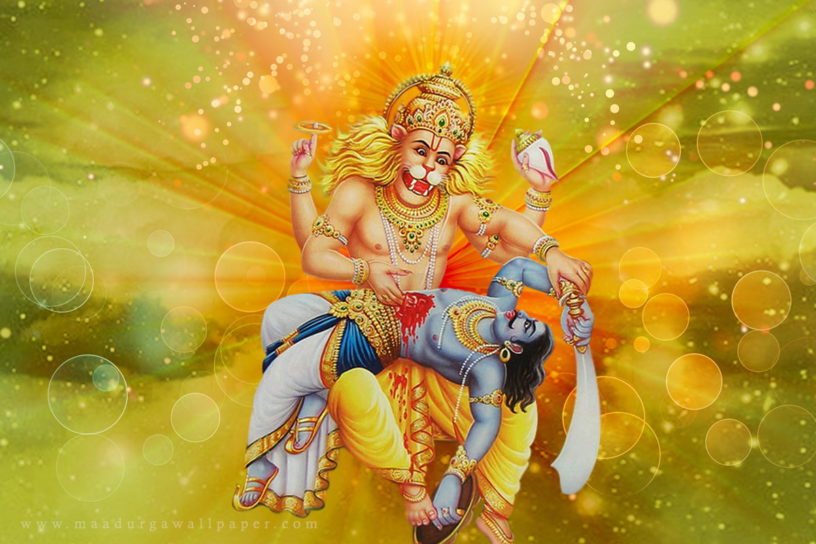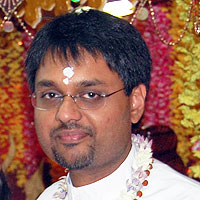Sanaatan Dharma defines the Unmanifest, Supreme Being as Nirguna Brahman or God, the Absolute, Eternal One without attributes. This same unqualified, non-differentiated Being, however, assumes a name and form, Saguna Brahman, and manifests on earth for specific purposes related to that age. When the Supreme Absolute identifies with sattva (the mode of purity and righteousness), It is called Vishnu, who carries out the function of sustenance in the universe. Vishnu acquires unlimited forms with different names and emblems, most prominent of which are the ten major or dasha avataars. These manifestations of the Divine signify the spiritual evolution of human life. As we celebrate Phagwa or Holi on March 24th, 2019, we remember the great devotee, Prahlad, whose faith ushered in the fourth major manifestation, Narsingh.
There once lived a king named Hiranyakashipu. Through many years of penance he had acquired a boon that he would not be killed during the day or night, in his house or outside it, by man or animal, by Deva or demon or by any man-made weapon. Rendered invincible, he believed he was God. His son Prahlad, who grew up in Sage Narada’s hermitage with his mother, was influenced by this sage, and he became a great devotee of Bhagavan Vishnu. He would chant Lord Vishnu’s name all the time.
Hiranyakashipu was very angry with Prahlad’s devotion to God, who he considered his enemy. So angry was Hiranyakashipu that he tried to kill Prahlad many times. Each time, God saved Prahlad. One day, the king asked his son, “You say that your God protects you. Can you show me where He is?” Prahlad replied, “God is everywhere.” Prahlad was standing near to a very hot pillar, so the king asked, “If your God is everywhere, then go and embrace your God in that pillar!” As he was about to embrace the pillar, Bhagavan Vishnu emerged from it in the form of Narsingh, half human and half lion. It was neither day nor night (twilight) when this happened. He carried the king to the threshold of the palace so that they were neither inside nor outside. There he placed King Hiranyakashipu on his lap and killed him with neither metal nor wood but his claws. Lord Vishnu had saved His devotee once again.
~ ~ ~ ~ ~
While the story of Prahlad is well known, we should consider the implications in our lives. Prahlad was a young boy who refused to listen to his father’s instructions. The story of Prahlad tells us that children are obliged to obey their parents. However, if parents give anti-dharmic instructions, should a child follow them? Prahlad’s father insisted that Prahlad should not pray to Lord Vishnu. Prahlad resisted this instruction. His father then sent him to the teachers to instruct Prahlad that Bhagavan Vishnu was not God. Again, Prahlad resisted their training as they were against the principles of Sanaatan Dharma.
During this period of Phagwa or Holi, we enjoy ourselves but if we want a better society then we must consider two important aspects related to this observance: 1) the duty of the parents and 2) the duty of the teachers. They all have a profound influence on the child’s life. As such, they should be exemplars and give the children the dharmic foundation to move forward in life. Here, the parent, the teachers and the society insisted that a certain tradition be followed, which Prahlad resisted. He was the only one who said that Lord Vishnu was God and he refused to pray to his father.
The question then arises, where did Prahlad get the strength to stand against everyone, from his parents to his teachers to society, and to say he believed that Bhagavan Vishnu is God? We are told that before Prahlad was born, his mother was taken to live with the sages and holy ones. When Prahlad was born, Sage Narada instructed Prahlad and his mother in the ways of God, which influenced the child. If we want our children to have these value systems, then the role of the mother is extremely important. When a child is conceived, the personality of the child begins to be formed based on what the mother thinks, eats and does. Prahlad received his strength at birth through his mother and the Sage Narada. The child must be taught the right actions from a tender age.
Prahlad’s faith did not waiver; his mind did not move from his belief that Lord Vishnu is God. What made his faith even stronger? His experiences did, because he saw the miracles and works of God. So too, we must ensure that our children get this spiritual experience from birth. We must take them to the temple, to the pujas and the yagyas from a young age so that they may experience Divinity. Prahlad had faith in God and, in the end, God Himself appeared in the form of Narsingh. God appeared and championed the cause of Prahlad because he kept on that path of spirituality.
While we celebrate Phagwa, we must remember that this little six-year-old boy confronted tremendous odds but, because he had faith in God, he survived. In the nature versus nurture argument, many people say that we are a product of our environment. We say the environment is a product of humans. We are the product of our upbringing. So, if we raise our children with spirituality, we will have better human beings and a better society.
From a discourse, Pt. Gyandeo Persad, Spiritual Leader of SWAHA Sukh Shanti Bhakti Mandali




Rabindra
Woderful Article